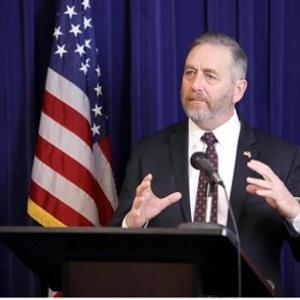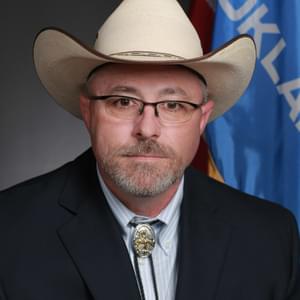
Senator Carolyn McGinn (left) and Kelson Bohnet (right)
In an August 14, 2024 op-ed in The Kansas City Star, Carolyn McGinn, a Kansas State Senate Republican representing District 31, and Kelson Bohnet, a capital public defender and board member for the Kansas Coalition Against the Death Penalty, argue that the state’s capital punishment system has failed, emphasizing its costliness, lack of deterrent effect, and inherent risk of “irreparable harm,” and call for abolition during the next legislative session.
“July 1 marked 30 years of failure,” they said. “If this were any other policy experiment, the death penalty would have been scrapped long ago. It is the ultimate failed big-government program. Everyone from every political party should agree that it’s time to move on and do things that actually work.”
Since the state’s reinstatement of the death penalty in 1994, marking the start of its post-Furman era, only 15 men have been sentenced to death, with the most recent death sentence imposed in 2016, and none have been executed — the state last carried out an execution in 1965. According to DPIC’s Death Penalty Census database, which is updated through January 1, 2022, two of these men have died on death row, four have been resentenced to life or less, and nine have active death sentences. The op-ed explains that none of these cases have completed the first stage of state post-conviction review, and even if both state and federal post-conviction appeals were to be completed, the state likely could not obtain the lethal injection drugs necessary to carry out an execution as pharmaceutical companies have imposed restrictions on use of their drugs. Meanwhile, the state’s public defender office “spends more than 12% of its budget on capital cases, but those cases account for less than 0.1% of the system’s caseload,” and “a recent state-specific study found that prosecutors and courts also bear significant additional expenses.” Instead of “this unnecessary spending,” the authors argue for a reallocation of funds towards victims’ services and judicial reforms aimed at a “fairer and more efficient” system.
As it stands, “the public at large hasn’t benefited” from the death penalty. The op-ed cites a lack of evidence to support the death penalty as a deterrent for murder in the state, concluding that “[s]ociety is no safer” than they would be with sentences of life without parole. Currently, victims’ families must endure “decades of appeals and legal challenges” rather than being provided “closure available through a speedy trial, appeal and life sentence with no release.” By retaining an irreversible punishment, the state also “risk[s] the irreparable harm of executing an innocent person. … The moral harm that Kansans would suffer from a wrongful execution cannot be understated,” write Senator McGinn and Mr. Bohnet.
The state’s most recent legislative session saw the bipartisan introduction of abolition bills in both chambers, with Senator McGinn among the sponsors of abolition bill SB 211, but also the introduction of a bill (SB 534) to authorize nitrogen hypoxia as an execution method by Attorney General Kris Kobach, who “framed this troubling proposal as Kansas needing to decide whether it actually wanted the death penalty.” The article recounts, “When faced with that decision, two separate committees of elected leaders refused to move the bill forward.” Although both abolition bills, HB 2349 and SB 211, also failed to pass, the authors recommend that legislators follow-through in the next legislative session.
“A bipartisan legislative majority, along with Gov. Laura Kelly, is primed and ready to end this failed government program,” concludes the op-ed. “Kansans should demand that murderers are punished severely but smartly through life without parole, and state House and Senate leadership should be brave enough to allow death penalty repeal to get a hearing and vote.”
CAROLYN MCGINN AND KELSON BOHNET, Kansas’ death penalty is the ultimate failed big government program. Time to end it, The Kansas City Star, August 14, 2024;
New Voices
Jun 25, 2024

Articles of Interest: A Look at the Difficulties Faced by Fathers on North Carolina’s Death Row
New Voices
Dec 13, 2023

